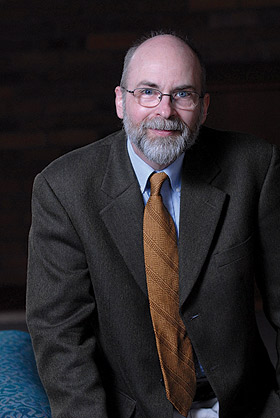News Archives - 2010
Off to England to test a theory
 To a humanities scholar like Dal Liddle, $6,000 is a lot of money. Ask him and he'll joke, in an imitation of Austin Powers' Dr. Evil, about his glee at receiving such a meager amount compared to the research grants won by his colleagues in the sciences. "Six THOUSAND dollars!"
To a humanities scholar like Dal Liddle, $6,000 is a lot of money. Ask him and he'll joke, in an imitation of Austin Powers' Dr. Evil, about his glee at receiving such a meager amount compared to the research grants won by his colleagues in the sciences. "Six THOUSAND dollars!"
But that $6,000, in the form of a National Endowment for the Humanities summer stipend, will help Liddle test a hypothesis he's been formulating for a while. The question: What if literary history turns out to change in some of the same ways that technological history changes? Could the history of novels and poems show some of the same patterns as the history of steam engines, microchips, and jet airplanes?
The NEH seems interested enough in that question to have awarded Liddle one of the prestigious and competitive summer stipend awards for 2010. Each year 800 or more applications are submitted for these grants, but only 10 percent or fewer are funded after a stringent double review process. This year 1,023 humanities scholars applied for the grant, and only 85 stipends were awarded nationwide.
"Everybody in the humanities knows it's a killer cut you make to get these grants," Liddle says. "For a school of Augsburg's size, it's a very nice award."
Liddle, an associate professor of English whose research focuses on Victorian literature, will use the money to spend three weeks in England poring over the private archives of the London Times and the early Victorian holdings of the British Library. Using Austen's Pride and Prejudice, editorial articles from British papers, and Bronte's Jane Eyre, he will try to test whether current theories about the historical development of technology will also fit the way British literature developed between 1800 and 1850.
"I'm taking a big chance," he says about his research question. "There's a big disprovability factor here, but if I'm wrong I want to prove it."
Augsburg faculty frequently receive national research grants, but typically they are awarded in the sciences. "This is the sort of thing we ought to be doing in the humanities—research that is nationally competitive but broad enough and hopefully cool enough to appeal to a larger audience," Liddle says.
Inside Augsburg showcases the experiences of Augsburg College students, alumni, staff, and faculty. Send your story idea to marcomm@augsburg.edu.